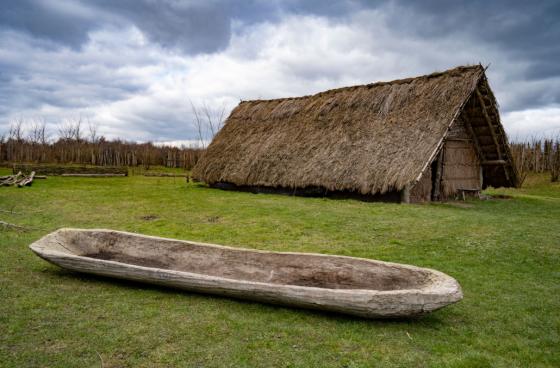Locations:
Symposium: Cultural Heritage Agency, Amersfoort;
Workshop days: Masamuda, Vlaardingen
Credits: 2 EC
Experimental archaeology can be a powerful tool for interpreting the past. It is often used in the creation of reference collections to study micro-wear traces and technological aspects of flint tool production. The method can be applied to all materials which were used in the past, from bronze tools and ceramics to animal skins and plant fibers. Yet, at present experimental archaeology is not being taught as an independent course in Dutch universities. Therefore, this fieldschool aims to introduce students to experimental archaeology. Students will be introduced both to the methodological and scientific aspects as well as the practical aspects in the field. The summer school will consist of two parts, a one day symposium followed by two days of practical experimental archaeology workshops in Masamuda (Vlaardingen). The summer school is a cooperation with the NWO-project ‘Putting life into neolithic houses’ by the Leiden University.
Learning goals
After the event the participants of the summer school are able to set up an archaeological experiment themselves. They know what conditions must be met for an archaeological experiment to be of scientific value, how they can use experimental archeology for their own research and they have thought about how they can involve the public in their experiment. The participants will also increase their knowledge about the way objects are made and used by means of experimental archaeology.
Assignment
2 EC is for attending the symposium, the two day workshops, the background reading and handing in the report (see below).
- Students write an individual report about the experiment they designed, performed and documented. Together with the students from the same group (the same topic) they have to write a conclusion based on all the experiments from the group.
- Students read mandatory literature before the event and think about how to conduct and document the part of the experiment on which they will work during the workshop. They will hand-in a short proposal (1 page) for this with references to the required literature, and optionally more literature. They need to think about what you need to conduct the experiment, what you need to document it, and which variables you need to document in order to create useful data with the experiment.
Preliminary Program
21-08-2023: Symposium
10.00-10.30 Annelou van Gijn: Experimental archaeology in theory and practice: exploring past technology
10-30-11.00 Yvonne Lammers-Keijsers: Live report from the fourteenth century – how to engage the broader public, craftspeople and scientists in a medieval setting
11.00-11.30 break: coffee/tea
11.30-12.00 Mans Schepers: Testing hypotheses and dewilding the past: arable farming on salt marshes
12.00-12.30 Lucy Kubiak-Martens
12.30-13.30 lunch
13.30-14.00 Noora Taipale
14.00-14.30 TBA
14.30-15.00 break: coffee/tea
15.00-16.00 introduction for the workshops (other symposium participants can leave during the break)
22 and 23-08-2023: Workshop days
There are 4 different workshops with different themes:
- What can you do with an animal?
- Basketry and textile production with plant fibers
- Building a Neolithic house
- Cooking (using pottery)
Each workshop can accommodate approximately 5 participants for two days. Together the students in each workshop perform five different experiments. The experiments are devised in advance by the working group leader. Every student is responsible for one specific experiment but they can choose to work together (this is necessary for the building workshop). During the two day workshop they have to design the experiment (make an action plan), perform it and document it. Afterwards they make a report about the experiment they were responsible for.
24-08-2023: Extra day (optional)
Yvonne Lammers-Keijsers offers all interested participants of the workshop the opportunity to visit her in the Prehistoric village/Museum Eindhoven where she is doing her living experiment in the 14th century. Entry for those that want to come is free. She is able to tell everyone on location what she’s been doing and the things she learned/and problems she encountered.
Registration: Registration is from 1st of May to the 1st of June 2023. You can register for the full summer school program or just for the symposium. If you want to participate in the summer school, please indicate a first and a second preference for a workshop. We will try to comply with that as much as possible. The program for the workshop is preliminary. The final program of the workshop will be determined on the basis of the number of participants on 1st of June.
Participation for non-Archon members is possible. A maximum of 5 non-Archon participants can participate in the summer school against payment of 250 euros (including symposium). Participation for non-Archon members in the symposium alone is also possible. There is no advance limit to the number of non-Archon members that can participate in the symposium. The costs for participation in the symposium are 15 euros and cover only the catering. In case of great interest, Archon members have priority.
To participate, send an email to Ana Smuk (a.smuk@rug.nl) before the 1st of June, indicating:
- your name;
- your email address
- if you are an Archon member or not,
- and if this is the case please mention if you are a RMA student, PhD student or a Staff member and from which university
- if you want to participate in de summerschool (including workshop preferences) or only the symposium;
- if you have dietary restrictions.

